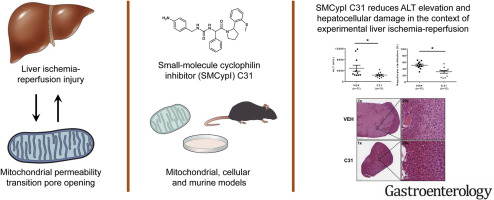当前位置:
X-MOL 学术
›
Gastroenterology
›
论文详情
Our official English website, www.x-mol.net, welcomes your feedback! (Note: you will need to create a separate account there.)
Small-Molecule Inhibitors of Cyclophilins Block Opening of the Mitochondrial Permeability Transition Pore and Protect Mice From Hepatic Ischemia/Reperfusion Injury.
Gastroenterology ( IF 29.4 ) Pub Date : 2019-07-20 , DOI: 10.1053/j.gastro.2019.07.026 Mathieu Panel 1 , Isaac Ruiz 2 , Rozenn Brillet 2 , Fouad Lafdil 3 , Fatima Teixeira-Clerc 2 , Cong Trung Nguyen 4 , Julien Calderaro 4 , Muriel Gelin 5 , Fred Allemand 5 , Jean-François Guichou 5 , Bijan Ghaleh 1 , Abdelhakim Ahmed-Belkacem 2 , Didier Morin 1 , Jean-Michel Pawlotsky 6
Gastroenterology ( IF 29.4 ) Pub Date : 2019-07-20 , DOI: 10.1053/j.gastro.2019.07.026 Mathieu Panel 1 , Isaac Ruiz 2 , Rozenn Brillet 2 , Fouad Lafdil 3 , Fatima Teixeira-Clerc 2 , Cong Trung Nguyen 4 , Julien Calderaro 4 , Muriel Gelin 5 , Fred Allemand 5 , Jean-François Guichou 5 , Bijan Ghaleh 1 , Abdelhakim Ahmed-Belkacem 2 , Didier Morin 1 , Jean-Michel Pawlotsky 6
Affiliation

|
BACKGROUND & AIMS
Hepatic ischemia/reperfusion injury is a complication of liver surgery that involves mitochondrial dysfunction resulting from mitochondrial permeability transition pore (mPTP) opening. Cyclophilin D (PPIF or CypD) is a peptidyl-prolyl cis-trans isomerase that regulates mPTP opening in the inner mitochondrial membrane. We investigated whether and how recently created small-molecule inhibitors of CypD prevent opening of the mPTP in hepatocytes and the resulting effects in cell models and livers of mice undergoing ischemia/reperfusion injury.
METHODS
We measured the activity of 9 small-molecule inhibitors of cyclophilins in an assay of CypD activity. The effects of the small-molecule CypD inhibitors or vehicle on mPTP opening were assessed by measuring mitochondrial swelling and calcium retention in isolated liver mitochondria from C57BL/6J (wild-type) and Ppif-/- (CypD knockout) mice and in primary mouse and human hepatocytes by fluorescence microscopy. We induced ischemia/reperfusion injury in livers of mice given a small-molecule CypD inhibitor or vehicle before and during reperfusion and collected samples of blood and liver for histologic analysis.
RESULTS
The compounds inhibited peptidyl-prolyl isomerase activity (half maximal inhibitory concentration values, 0.2-16.2 μmol/L) and, as a result, calcium-induced mitochondrial swelling, by preventing mPTP opening (half maximal inhibitory concentration values, 1.4-132 μmol/L) in a concentration-dependent manner. The most potent inhibitor (C31) bound CypD with high affinity and inhibited swelling in mitochondria from livers of wild-type and Ppif-/- mice (indicating an additional, CypD-independent effect on mPTP opening) and in primary human and mouse hepatocytes. Administration of C31 in mice with ischemia/reperfusion injury before and during reperfusion restored hepatic calcium retention capacity and oxidative phosphorylation parameters and reduced liver damage compared with vehicle.
CONCLUSIONS
Recently created small-molecule inhibitors of CypD reduced calcium-induced swelling in mitochondria from mouse and human liver tissues. Administration of these compounds to mice during ischemia/reperfusion restored hepatic calcium retention capacity and oxidative phosphorylation parameters and reduced liver damage. These compounds might be developed to protect patients from ischemia/reperfusion injury after liver surgery or for other hepatic or nonhepatic disorders related to abnormal mPTP opening.
中文翻译:

亲环蛋白的小分子抑制剂可阻断线粒体通透性转化孔的开放,并保护小鼠免受肝缺血/再灌注损伤。
背景与目的肝缺血/再灌注损伤是肝脏手术的一种并发症,涉及由于线粒体通透性转换孔(mPTP)开口而引起的线粒体功能障碍。亲环蛋白D(PPIF或CypD)是一种肽基-脯氨酰顺反异构酶,可调节线粒体内膜中的mPTP开口。我们调查了是否以及最近如何创建CypD的小分子抑制剂阻止mPTP在肝细胞中的开放,以及在经历缺血/再灌注损伤的小鼠的细胞模型和肝脏中的作用。方法在CypD活性测定中,我们测量了9种亲环蛋白小分子抑制剂的活性。通过测量来自C57BL / 6J(野生型)和Ppif-//(CypD基因敲除)小鼠和原代小鼠的分离的肝线粒体中的线粒体肿胀和钙保留,来评估小分子CypD抑制剂或媒介物对mPTP开放的影响。和人类肝细胞的荧光显微镜检查。在再灌注之前和期间,我们在给予小分子CypD抑制剂或赋形剂的小鼠肝脏中诱导了缺血/再灌注损伤,并收集了血液和肝脏样品进行组织学分析。结果这些化合物通过防止mPTP的开放(半数最大抑制浓度值为1.4-132μmol)抑制肽基-脯氨酰异构酶活性(最大抑制浓度一半为0.2-16.2μmol/ L),从而抑制了钙诱导的线粒体肿胀。 / L)。最有效的抑制剂(C31)以高亲和力结合CypD,并抑制野生型和Ppif-/-小鼠肝脏线粒体的肿胀(表明对mPTP开放有额外的CypD非依赖性作用)以及原代人和小鼠肝细胞。与媒介物相比,在缺血/再灌注损伤之前和之中的小鼠中施用C31可恢复肝钙保留能力和氧化磷酸化参数,并减少肝脏损伤。结论最近开发的CypD小分子抑制剂可降低钙诱导的小鼠和人肝组织线粒体肿胀。在缺血/再灌注期间向小鼠施用这些化合物可恢复肝钙保留能力和氧化磷酸化参数,并减少肝脏损伤。
更新日期:2019-11-18
中文翻译:

亲环蛋白的小分子抑制剂可阻断线粒体通透性转化孔的开放,并保护小鼠免受肝缺血/再灌注损伤。
背景与目的肝缺血/再灌注损伤是肝脏手术的一种并发症,涉及由于线粒体通透性转换孔(mPTP)开口而引起的线粒体功能障碍。亲环蛋白D(PPIF或CypD)是一种肽基-脯氨酰顺反异构酶,可调节线粒体内膜中的mPTP开口。我们调查了是否以及最近如何创建CypD的小分子抑制剂阻止mPTP在肝细胞中的开放,以及在经历缺血/再灌注损伤的小鼠的细胞模型和肝脏中的作用。方法在CypD活性测定中,我们测量了9种亲环蛋白小分子抑制剂的活性。通过测量来自C57BL / 6J(野生型)和Ppif-//(CypD基因敲除)小鼠和原代小鼠的分离的肝线粒体中的线粒体肿胀和钙保留,来评估小分子CypD抑制剂或媒介物对mPTP开放的影响。和人类肝细胞的荧光显微镜检查。在再灌注之前和期间,我们在给予小分子CypD抑制剂或赋形剂的小鼠肝脏中诱导了缺血/再灌注损伤,并收集了血液和肝脏样品进行组织学分析。结果这些化合物通过防止mPTP的开放(半数最大抑制浓度值为1.4-132μmol)抑制肽基-脯氨酰异构酶活性(最大抑制浓度一半为0.2-16.2μmol/ L),从而抑制了钙诱导的线粒体肿胀。 / L)。最有效的抑制剂(C31)以高亲和力结合CypD,并抑制野生型和Ppif-/-小鼠肝脏线粒体的肿胀(表明对mPTP开放有额外的CypD非依赖性作用)以及原代人和小鼠肝细胞。与媒介物相比,在缺血/再灌注损伤之前和之中的小鼠中施用C31可恢复肝钙保留能力和氧化磷酸化参数,并减少肝脏损伤。结论最近开发的CypD小分子抑制剂可降低钙诱导的小鼠和人肝组织线粒体肿胀。在缺血/再灌注期间向小鼠施用这些化合物可恢复肝钙保留能力和氧化磷酸化参数,并减少肝脏损伤。



























 京公网安备 11010802027423号
京公网安备 11010802027423号